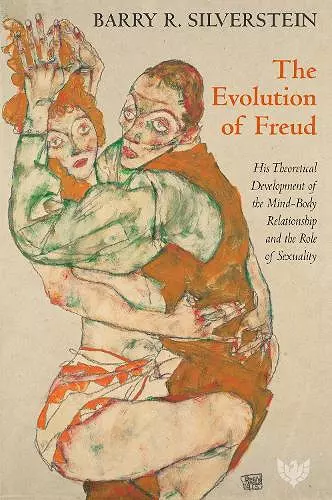The Evolution of Freud
His Theoretical Development of the Mind–Body Relationship and the Role of Sexuality
Format:Paperback
Publisher:Karnac Books
Published:9th Mar '22
Should be back in stock very soon

Renowned Freud scholar Barry R. Silverstein presents in a historical context an overview of the development of Freud’s theories. What was Freud thinking, when, and why, and what were the major influences which shaped his ideas? The book follows the inner movement of Freud’s theory construction, its meaning and coherence, as well as his conceptual logic and personal directions concerning his evolving views of the reciprocal interactions between mind and body, the motivational force of instinctual drives, and the dominant role of sexuality rooted in evolutionary biology in human development, behaviour, and the creation of neurotic disturbances. It also follows Freud’s construction and sequential reconstructions of his theoretical models concerning the nature, dynamics, and principles of unconscious mental functioning, including his changing concepts on the nature and purpose of dreams. The book traces his changing views on the role of deferred action of early childhood experiences, the determining role of unconscious fantasy, and psychic reality in the formation of adult character structure and neuroses. Through such historical analysis, The Evolution of Freud provides grounding for a meaningful understanding of Freud’s familiar concepts: id, ego, superego, and the Oedipus complex. It explores what these concepts meant to Freud, why he conceived them, and what functions they served in his theory of mind.
This is the perfect book for students and trainees wanting to learn more about the development of Freud’s ideas, as well as for established psychoanalysts and psychotherapists interested in expanding their knowledge of Freud’s theories.
'In my estimation, Silverstein’s book … may well be one of the very best means of encountering Freud and engaging with his life and work. Moreover, this text will be of value not only to new students but, also, to old friends as well, as each of us still has so very much to learn about the progenitor of modern global mental health. […] I congratulate Professor Silverstein on this outstanding and, indeed, loving achievement, and I recommend this book most warmly to us all.'
-- Professor Brett Kahr, from the Foreword‘It is not a long book but it covers a lot of ground with welcome clarity, precision and many suggestions for further reading. Silverstein doesn’t assume prior knowledge but equally doesn’t patronise.’
-- Nick Campion, Therapy Today November 2022‘The Evolution of Freud provides an accessible review of Freud's thought. Barry R. Silverstein situates Freud in the late nineteenth century, elaborating on the intellectual and scientific teachings Freud encountered as a student and young physician. From there, he traces how Freud created a discipline, and therapeutic practice, designed to explore unconscious meaning.’
-- Judith M. Hughes, author of From Freud's Consulting Room: The Unconscious in a Scientific Age‘Professor Barry R. Silverstein’s The Evolution of Freud is an adventure into Sigmund Freud’s thinking about the mind–body relationship and the role of sexuality in the structure of the psyche. He doesn’t just tell us what Freud thought he tells us how Freud thought. Silverstein includes the medical–intellectual context within which Freud was educated and pursued his interests, and also the way Freud thought about one problem after another in search of answers that would open doors to understanding the human psyche. Silverstein shows us how Freud struggled to understand psychiatric problems, theoretical conflicts, and all the new questions they raised. We witness Freud’s struggle to make sense of phenomena for which no previous theoretical concepts existed and his courageous efforts to find a way to create a comprehensive theory of the mind that future generations could develop and extend. Silverstein reminds us of the popular critiques regarding Freud’s cocaine use, sexism, intolerance, possible affair with his sister-in-law, lack of a scientific method, and so on, but, after spending four decades studying Freud’s work, Silverstein also appreciates (1) the “continuing relevance and application” of Freud’s ideas and concepts, (2) the significant scientific legacy he left in understanding how dynamic unconscious processes could affect cognitive functions, and (3) the powerful and clinically useful understanding of repetitive behavior patterns in human relationships – the repetition compulsions. In agreement with Silverstein, I would say yes, we all have our foibles but few of us write twenty-three volumes of enduring creativity to illuminate the human soul.’
-- Daniel S. Benveniste, PhD, Honorary Member of the American Psychoanalytic Association and author of The Interwoven Lives of Sigmund, Anna, and W. Ernest Freud: Three Generations of Psychoanalysis'It is invaluable to know about Freud’s work. Even those who may disagree with much of it cannot understand contemporary psychoanalysis without appreciating the ways virtually all of post-Freudian psychoanalysis is a reaction to, an elaboration of, or an attempted improvement on Freud. But few people will be able to study and master the twenty-four volumes of his collected writings. The Evolution of Freud provides just what is needed: a profound, perceptive, penetrating presentation of the development of Freud’s thinking in an accessible, readable book.'
-- James William Anderson, PhD, Professor of Clinical Psychiatry and Behavioral Sciences, Northwestern University; former President of the Chicago Psychoanalytic SocISBN: 9781912691401
Dimensions: 229mm x 152mm x 11mm
Weight: 304g
174 pages